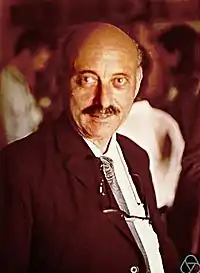Bernhard Neumann
Bernhard Hermann Neumann AC FRS[1] (15 October 1909 – 21 October 2002) was a German-born British-Australian mathematician who was a leader in the study of group theory.[2][3]
Bernhard Neumann | |
|---|---|
 | |
| Born | 15 October 1909 |
| Died | 20 October 2002 (aged 93) |
| Nationality | British and Australian |
| Alma mater | University of Berlin University of Cambridge |
| Known for | Petr–Douglas–Neumann theorem Hahn–Mal'cev–Neumann series HNN extension Outer billiard Absolute presentation of a group |
| Awards | Adams Prize (1952) |
| Scientific career | |
| Fields | Mathematics |
| Institutions | Australian National University University of Manchester |
| Doctoral advisor | Issai Schur Philip Hall |
| Doctoral students | Gilbert Baumslag John Britton James Wiegold |
Early life and education
After gaining a D.Phil. from Friedrich-Wilhelms Universität in Berlin in 1932 he earned a Ph.D. at the University of Cambridge in 1935 and a Doctor of Science at the University of Manchester in 1954. His doctoral students included Gilbert Baumslag, László Kovács, Michael Newman, and James Wiegold. After war service with the British Army, he became a lecturer at University College, Hull, before moving in 1948 to the University of Manchester, where he spent the next 14 years. In 1954 he received a DSc from the University of Cambridge.
In 1962 he migrated to Australia to take up Foundation Chair of the Department of Mathematics within the Institute of Advanced Studies of the Australian National University (ANU), where he served as head of the department until retiring in 1974. In addition he was a senior research fellow at the CSIRO Division of Mathematics and Statistics from 1975 to 1977 and then honorary research fellow from 1978 until his death in 2002.
His wife, Hanna Neumann, and son, Peter M. Neumann, are also notable for their contributions to group theory.
He was an invited speaker of the International Congress of Mathematicians in 1936 at Oslo[4] and in 1970 at Nice. He was elected a Fellow of the Royal Society in 1959.[1] In 1994, he was appointed a Companion of the Order of Australia (AC).[5]
The Australian Mathematical Society awards a student prize named in his honour.[6] The group-theoretic notion of HNN extension (where HNN stands for Higman–Neumann–Neumann) is named in (second) part after him.
Career
- Assistant lecturer, University College, Cardiff, 1937–40.
- Army Service, 1940–45.
- Lecturer, University College, Hull, (now University of Hull), 1946–48
- Lecturer, senior lecturer, reader, Manchester, 1948–61
- Professor and head of Department of Mathematics, Institute of Advanced Studies, ANU, Canberra, 1962–74; Emeritus Professor, 1975–2002.
- Senior research fellow, CSIRO Division of Mathematics and Statistics, 1975–77; honorary research fellow, 1978–99.
- Founding member of the World Cultural Council, 1981.[7]
Awards
- 1984 Matthew Flinders Medal and Lecture
- 1952 Adams Prize, University of Cambridge
References
- Praeger, C. E. (2010). "Bernhard Hermann Neumann AC. 15 October 1909 -- 21 October 2002". Biographical Memoirs of Fellows of the Royal Society. 56: 285–316. doi:10.1098/rsbm.2010.0002.
- O'Connor, John J.; Robertson, Edmund F., "Bernhard Neumann", MacTutor History of Mathematics archive, University of St Andrews.
- Bernhard Neumann at the Mathematics Genealogy Project
- Neumann, B. H. "Identical relations in groups" (PDF). In: Comptes Rendus du Congrès International des Mathématiciens, Oslo, 1936. vol. 2. pp. 18–19.
- It's an Honour: AC
- "Aust MS : The Bernhard Neumann Prize".
- "About Us". World Cultural Council. Retrieved November 8, 2016.